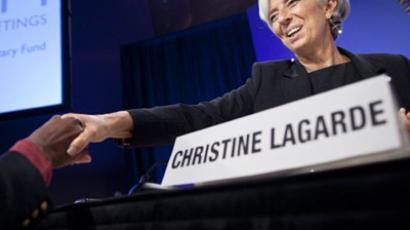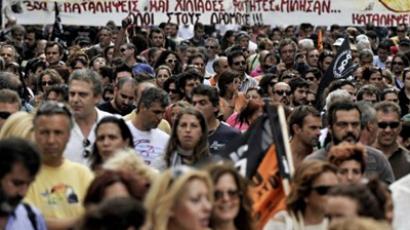Greece prepares for audit as nation boils over
A European audit team is expected in Greece to monitor progress in reducing its debt before deciding whether to release further bailout cash. Fresh austerity measures have sparked a new wave of violent protests outside the Greek parliament.
The ‘troika’ audit team from the European Union, European Central Bank and IMF is expected to arrive in Greece this week. Their main goal is to check if the country is capable of meeting fiscal targets set by its creditors.Greece opened the way for the audit team by passing the most unpopular austerity measure yet – a new property tax.This new tax will be levied through electricity bills rather than being collected through the tax system. And those who refuse to pay risk having their power cut off. But electricity company workers have already said they will boycott the collection of the tax, RT’s Sara Firth reported. So the authorities’ ability to raise revenue from the new tax is now in doubt. Angry protests broke out on Tuesday evening outside parliament after the government passed the new measure, and the police were forced to disperse angry crowds with teargas.Desperate people are prepared to strike for a second day, saying their lives have become literally unbearable over the past year.Greeks have already endured cuts in government spending and suffered cuts to their pensions. A lot of people have lost their jobs and the unemployment rate is skyrocketing.On Tuesday, Greek Prime Minister George A. Papandreou was at conference of the Federation of German Industry in Berlin, addressing the audience with positive, confidence-building rhetoric and assuring his country’s creditors that Greece “will live up to all its commitments.”On Thursday, the German parliament is expected to vote on whether to lend yet more cash to Greece. Without this 8 billion euro injection, Greece might face bankruptcy by the middle of October.Since May 2010, the EU/IMF have granted Greece two rescue packages designed to help it escape default. In exchange, Greece undertook to implement a three-year austerity program. But so far, the measures have done little more than cripple the people without any real progress in reducing the country’s debt.
Demetri Kofinas, a blogger on economic affairs and RT contributor, says a structured default might turn out to be a solution. “I do not think Greece can stay in the EMU [Europe’s monetary union],” he told RT. “I think the smartest thing for the EU and IMF to do if they really want a solution would be a structured default for Greece, for Portugal, for Ireland, probably Spain. And to allow some of those countries, especially Greece, for example, for the public sector to issue drachmas again.”“It does not mean that euros do not have to circulate,” he went on. “But it would mean that kind of door currency system that we saw in Argentina after they exited the dollar peg.”“I think in the long term, the euro is not going to survive for reasons that we are already seeing in terms of national policies overwriting a pan-European policy,” he stated. “














